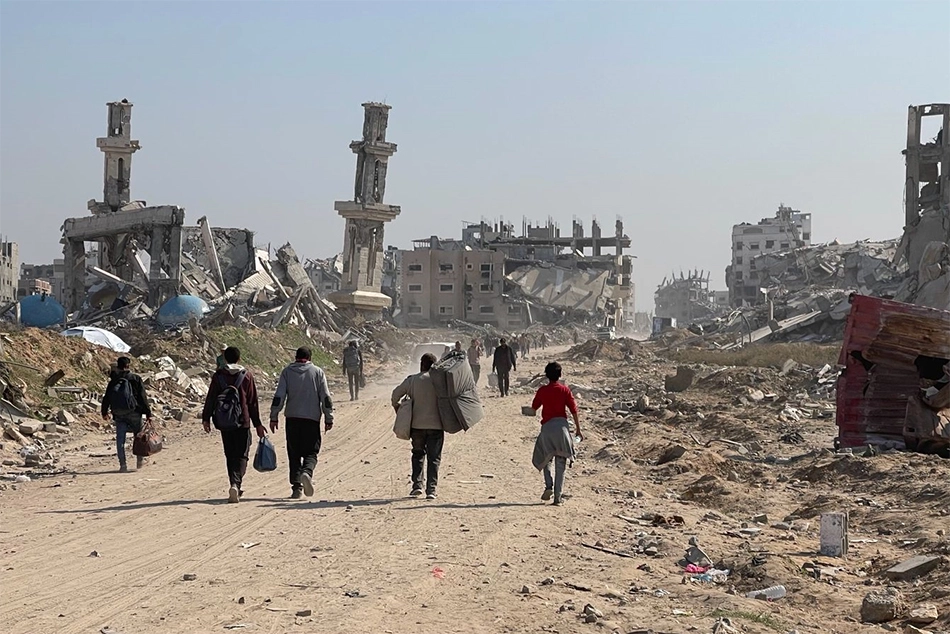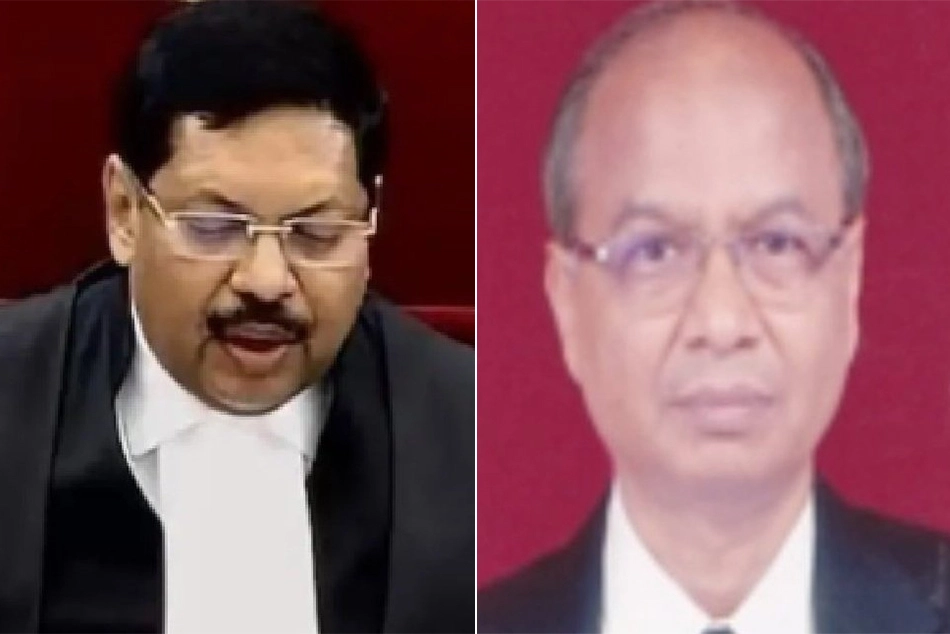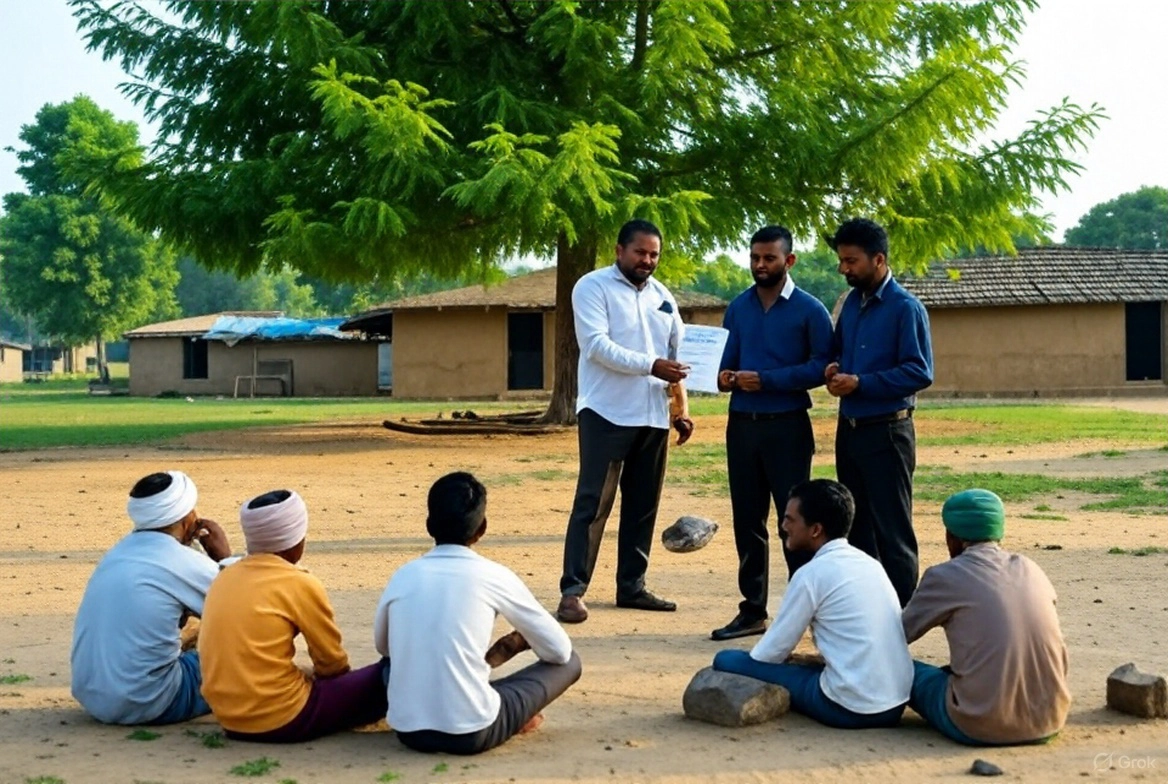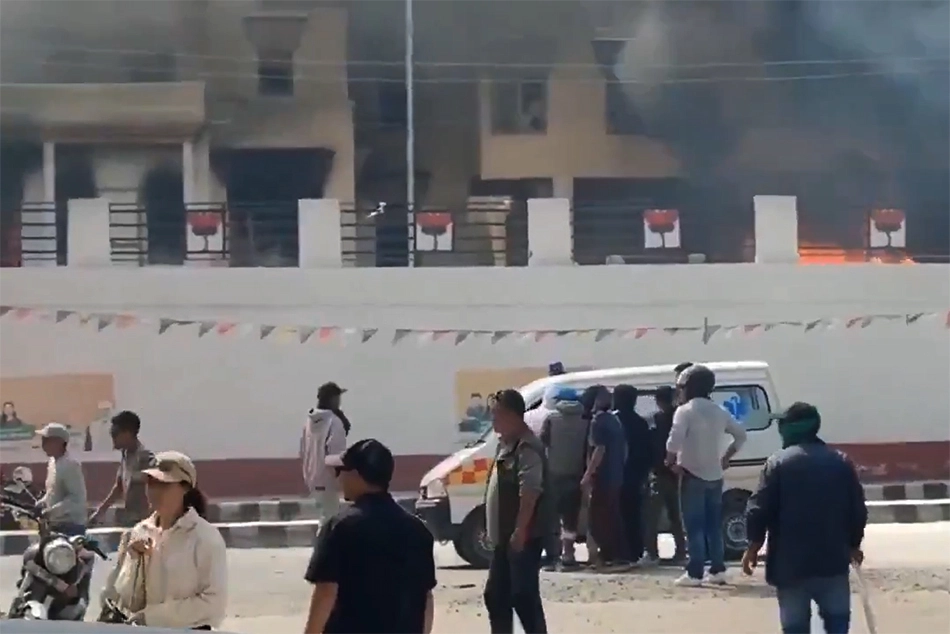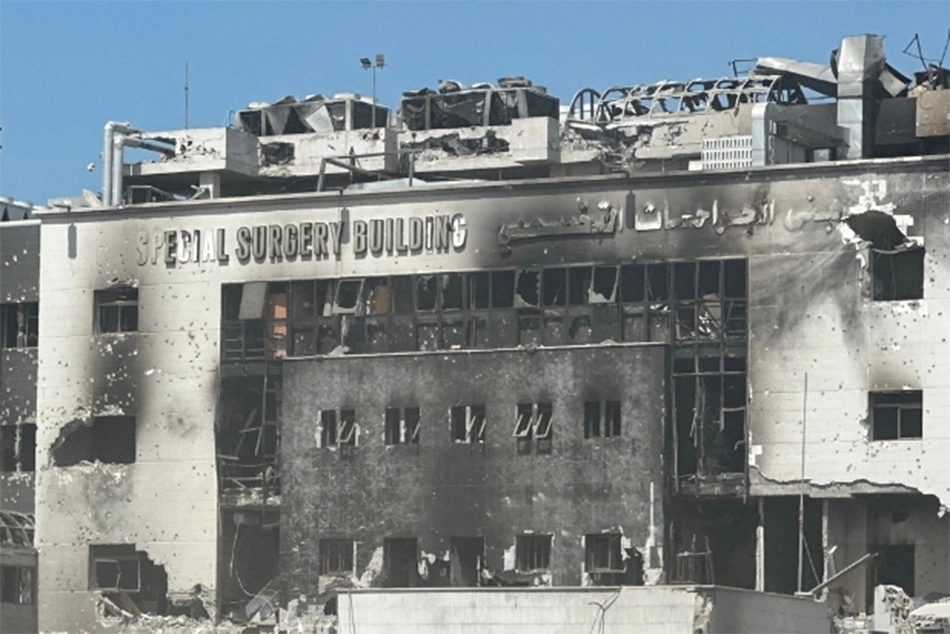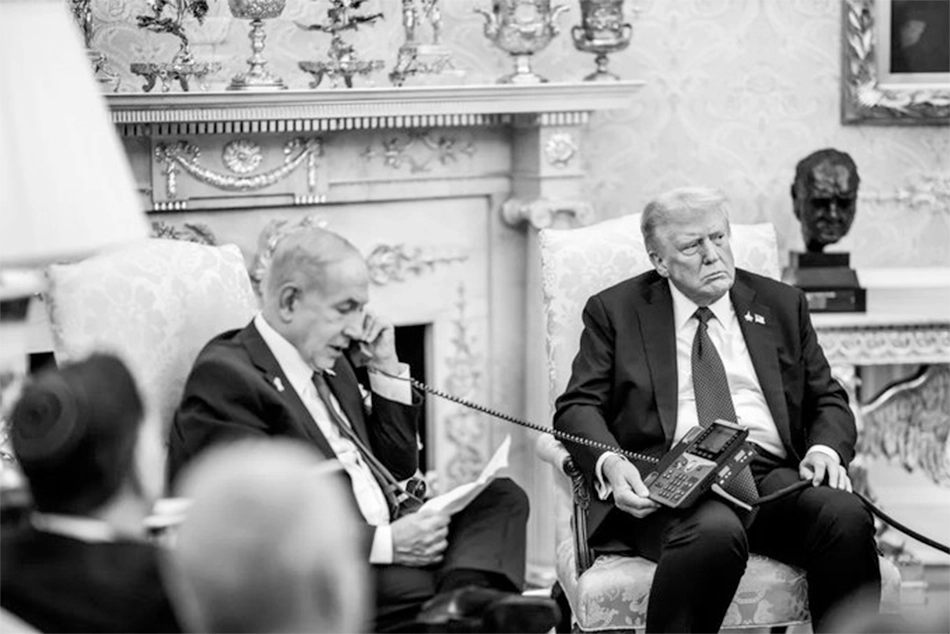
Afghan FM Muttaqi’s visit to India and Darul Uloom Deoband
Muttaqi’s visit to India should be acknowledged as a pragmatic and well-meaning move both by the Indian and Afghan leadership, and it may lead to stabilising the region besides isolating Pakistan
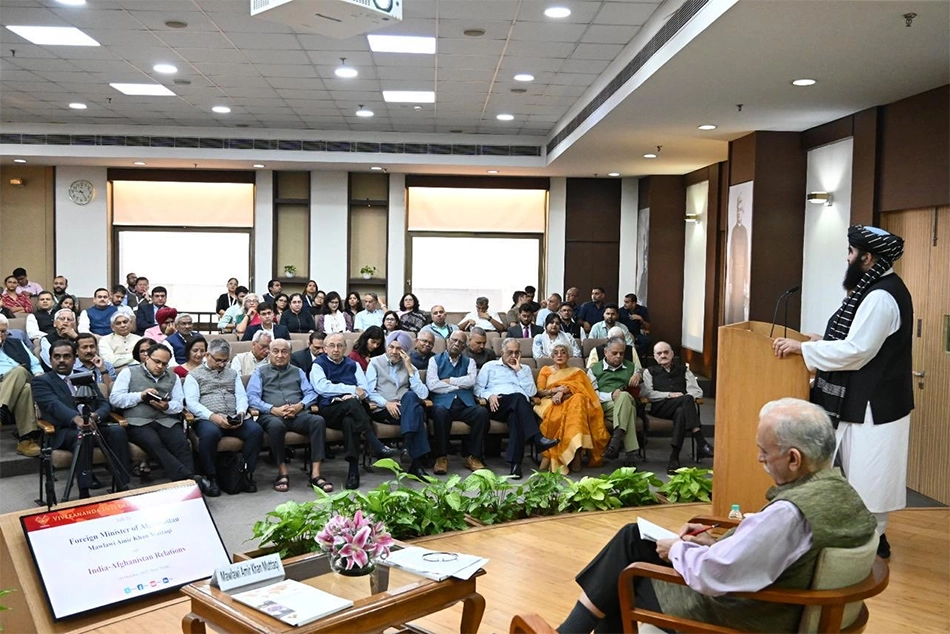
[Afghanistan Amir Khan Muttaqi addressing an event organised by RSS offshoot Vivekananda International Foundation (VIF) in New Delhi]
The Acting Foreign Minister of Afghanistan Amir Khan Muttaqi is on a 7-days visit to India.
Muttaqi's visit assumes importance as it is the first such high level visit by any Afghan official to India since the Taliban-led government of Islamic Emirate of Afghanistan was proclaimed in August 2021, after the abrupt and hasty withdrawal of American forces from the country.
Acting Foreign Minister of Afghanistan Amir Khan Muttaqi, who arrived in New Delhi on Thursday (October 09) held a meeting with Foreign Minister S Jaishankar in the national capital on the next day. In a post on X, Jaishankar said that the Afghan Foreign Minister's visit marks an “important step in advancing our ties and affirming the enduring India-Afghanistan friendship.”
India’s relations are now warming again under the second Taliban government. Although India has not yet officially recognised the Taliban regime, Afghanistan’s Foreign Minister's visit signals a strategic engagement for both the countries.
Muttaqi's maiden visit to India was marked by India restoring full diplomatic relations with Afghanistan. New Delhi will also upgraded its Technical Mission in Kabul to an embassy, Jaishankar said during his meeting with Muttaqi, asserting a "deep interest" in the progress of the neighbouring country.
Terror groups like the Lashkar-e-Taiba and Jaish-e-Mohammad have long operated from Afghan soil. But the Taliban has wiped out all terrorists in the last four years, claimed visiting Foreign Minister Amir Khan Muttaqi during his India visit, advising Pakistan to follow the same path of peace.
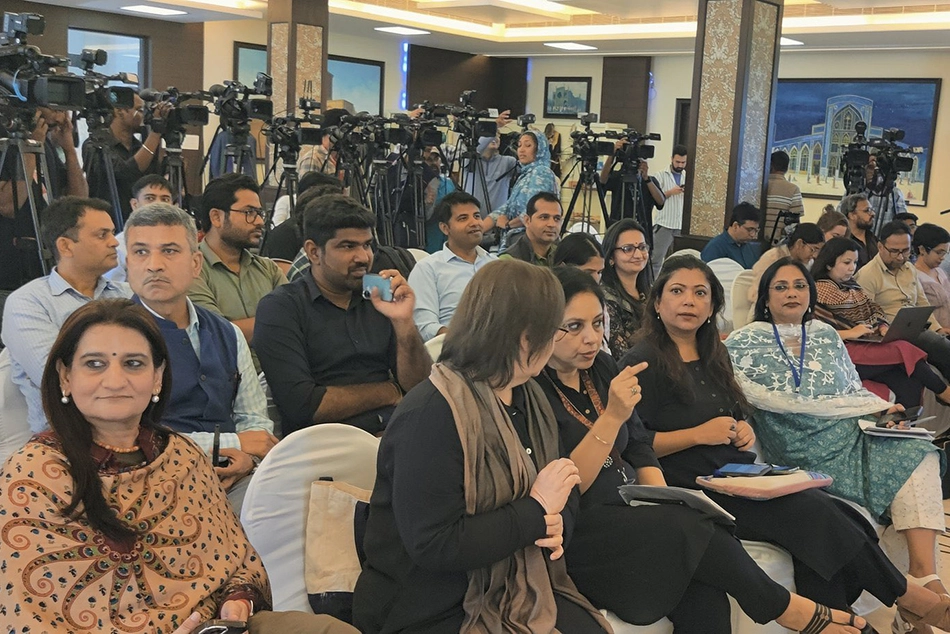
[Female journalists at Afghan FM Muttaqi's Press Conference in New Delhi.]
Muttaqi also had a message for Pakistan, delivered from the Indian soil that has been a victim of cross-border terrorism: "Let other countries also act against such terror groups like Afghanistan did for peace."
In his press conference, Muttaqi also addressed the reports of a recent blast in Kabul and accused Pakistan of orchestrating the act. He also warned that the courage of Afghans should not be tested.
"If someone wants to do this (cause Afghans trouble), they should ask the Soviet Union, America, and NATO. They will explain that it is not good to play games with Afghanistan," the minister said.Kabul also wants better relations with Islamabad, but it cannot be one-sided, he asserted.
Speaking on relationswith India, he praised New Delhi for being the first responder after the recent earthquake in Afghanistan."Afghanistan looks at India as a close friend. Afghanistan wants relations based on mutual respect, trade, and people-to-people relations. We are ready to create a consultative mechanism of understanding, which helps towards strengthening our relations," said the visiting minister.
Sending Pakistan a tough message from New Delhi, Muttaqi said: “The policy of the Islamic Emirate of Afghanistan is to resolve all problems through discussion and understanding. We want to have zero tension and if they don’t want that, then Afghanistan has other means.”
His remarks came a day after Pakistan summoned the Taliban ambassador to convey its “strong reservations” over the India-Afghanistan joint statement issued in New Delhi in which Kabul strongly condemned the terrorist attack in Pahalgam in April this year.
“We have good relations with the people of Pakistan and the government but some elements in that country are trying to create problems,” Muttaqi said.
Meanwhile, Muttaqi’s India visit was marred by two unconnected and unsavoury incidents. The first involved not inviting women journalists to his press conference in New Delhi. After the uproar from the journalistic community, the Afghan officials convened another press conference to undo the damage, at which women journalists were also invited.
This strange decision might have happened due to the strict policy of the Taliban against involving women in the public sphere, but in this case, they should have taken a pragmatic approach besides following the norms of the country in which they were present.
The second issue which gained quite a lot of traction was Muttaqi’s visit to Darul Uloom Deoband, the highest seat of Islamic learning and an institute which is also termed as the Al Azhar (the oldest and most influential Sunni Islamic seminary in the world) of the east. The critics wondered as to why Muttaqi visited Darul Uloom, which is often maligned as an institution spreading Wahabism amongst Indian Muslims, though it is far from truth.
Video: Amir Khan Muttaqi at Darul Uloom
But the critics should also acknowledge that before leaving for Darul Uloom, Muttaqi attended an event in New Delhi, organised by Vivekananda International Foundation (VIF),a think tankwith known links to the RSS. The VIF was founded in 2009 under the aegis of the Vivekananda Kendra, a spiritual organisation founded by Eknath Ranade, a prominent RSS leader in the 1970s, and is considered an RSS affiliate.The event was well attended by diplomats, security experts, and leading political and defence commentators.
So, if Muttaqi had no qualms about attending an event at an RRS-offshoot, why hue and cry should be made about his visit to Darul Uloom.
Before criticising, it would be better for the critics to get their facts right about Darul Uloom and Afghanistan, first. It is a known fact that before 1980, before the promulgation of a central law barring foreign students in India, a large number of students at Darul Uloom used to come from Afghanistan, Bangladesh, Myanmar and other central Asian republics, as Darul Uloom holds the highest place amongst the centres teaching moderate Islamic theology in south Asia.
In fact, many teachers (Ustaad) of some of the recent Taliban leaders studied at Darul Uloom and they spread the message of moderation and tolerance amongst their disciples in Afghanistan, Pakistan and elsewhere.
Additionally, most people know that ties between Afghanistan and India goes centuries back, and even if we don’t go so far back, then even in the last century, it was Afghanistan which provided a safe ground to the Indian freedom fighters.
Firstly, it was in Afghanistan that the first Indian government-in exile or the Provisional Government of India, was established in Kabul, Afghanistan, on December 1, 1915. It was led by President Raja Mahendra Pratap and Prime Minister Maulana Barkatullah.
Secondly, the Silk Letter Conspiracy led by Deobandi leadersin 1913-1920,duringIndian the independence movement was aimed to overthrow British rule through alliances with Germany, Turkey, and Afghanistan. The conspiracy was named for the letters written on silk cloth that were used to secretly communicate plans for an armed revolt, which were intercepted by the British.
Leaders like Maulana Mahmud Hasan and Maulana Obaidullah Sindhi were central figures in this effort, which ultimately failed but is recognised as a significant part of India's freedom struggle. I have written in details about these two historical events in my book, Demystifying Madrasah and Deobandi Islam.
Muttaqi’s visit to India should be acknowledged as a pragmatic and well-meaning move both by the Indian and Afghan leadership, and it may lead to stabilising the region besides isolating Pakistan.
(Asad Mirza is a New Delhi-based senior commentator on national, international, defence and strategic affairs, environmental issues, an interfaith practitioner, and a media consultant.)
Follow ummid.com WhatsApp Channel for all the latest updates.
Select Language to Translate in Urdu, Hindi, Marathi or Arabic
